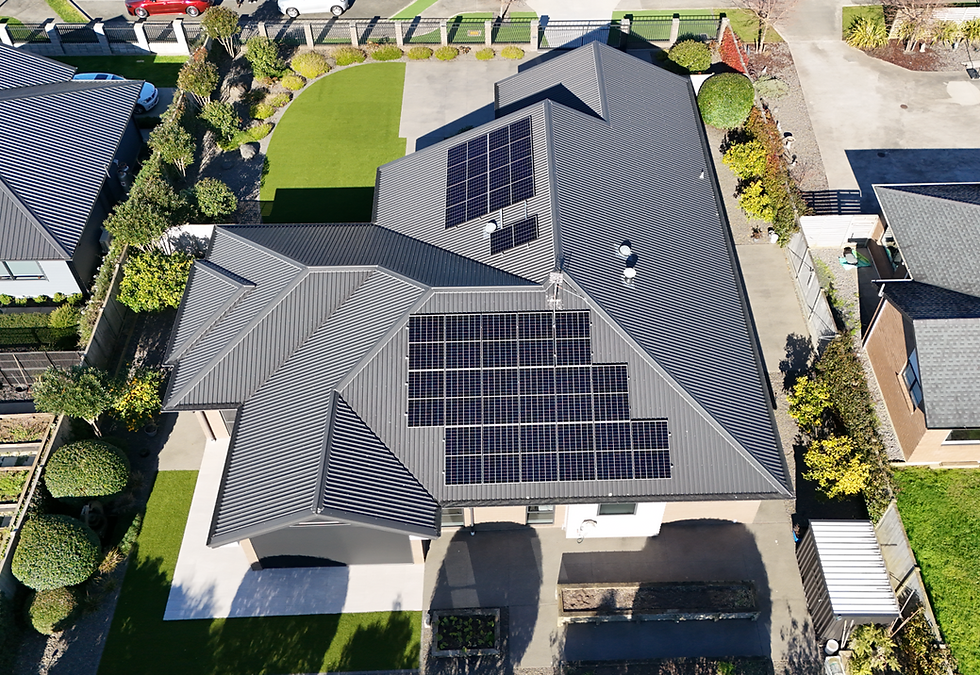5 Common Solar Myths (Debunked for Kiwi Homes)
- Solar Hub

- May 27, 2025
- 3 min read
Solar power has never been more popular in New Zealand, but with popularity comes plenty of questions—and a fair share of myths. If you’ve heard confusing tales about panels underperforming in winter or needing endless cleaning, you’re not alone. Let’s unpack five of the most common solar myths Kiwi homeowners encounter and set the record straight.
Myth 1: “Solar Power Doesn’t Work in Winter”
The Reality: You’d be surprised how much juice your panels still generate on a crisp, clear winter’s day. Although the sun sits lower in the sky, panels on a north-facing roof tilted at around 30° can produce up to 70 percent of their summer output. Cool temperatures even help panels run more efficiently—heat can actually make them a little sluggish. So don’t let a few rainy months scare you off; winter solar can still make a real dent in your bills.
Myth 2: “It’s Always Cloudy Here, So Solar Isn’t Worth It”
The Reality: Yes, New Zealand gets its share of grey days, but we also average more than 2,000 sunshine hours each year—depending on your region. Even on overcast days, panels will typically deliver 60–70 percent of their peak capacity. Plus, modern inverters and monitoring tools let you track generation in real time, so you can see exactly how much power you’re getting, come rain or shine.
Myth 3: “I’ll Be Cleaning My Panels Every Weekend”
The Reality: Unless your property is surrounded by heavy dust, pollen or bird droppings, Mother Nature usually handles most of the cleaning. Annual rainfall rinses off surface debris, and in most areas a quick spray-down once or twice a year is all that’s needed. If you live somewhere particularly dusty—say, near a farm track—you might choose to rinse more often, but for the vast majority of Kiwi homes, solar panels are basically self-cleaning.
Myth 4: “Solar Panels Will Damage My Roof”
The Reality: Professional installers use specialised mounting systems designed to protect your roof’s integrity. Each bracket is sealed with weather-proof flashing, so there’s no risk of leaks if the install is done correctly. In fact, panels can even shield sections of your roof from UV exposure, potentially extending the life of your shingles or tiles. And because Solar Hub works with experienced local installers, we stand by our workmanship and warranties to keep both your roof and your panels in top shape.

Myth 5: “I Need a Massive Solar System to See Any Benefit”
The Reality: Solar is flexible. You don’t have to go all-in with a 10 kW array to enjoy savings. Even a modest 3 kW system can cover a significant slice of an average household’s daytime electricity needs—enough to run kettles, TVs and lighting without dipping into the grid. By reviewing your past electricity bills (we recommend the last three months), you can zero in on the right system size for your home and budget, whether that’s small and savvy or larger for maximum offset.
In Summary
Solar myths often stem from outdated information or confusion around how modern systems really work. By understanding that panels still perform well in winter, rain does most of the cleaning, professional mounts protect your roof, and you can tailor system size to your needs, you’ll be in a great position to decide for yourself. If you’re curious to see what solar could do on your roof, gather your address and recent power bills for a free, no-obligation assessment with Solar Hub. Here’s to clear skies—and clearer solar facts!
.png)



Comments